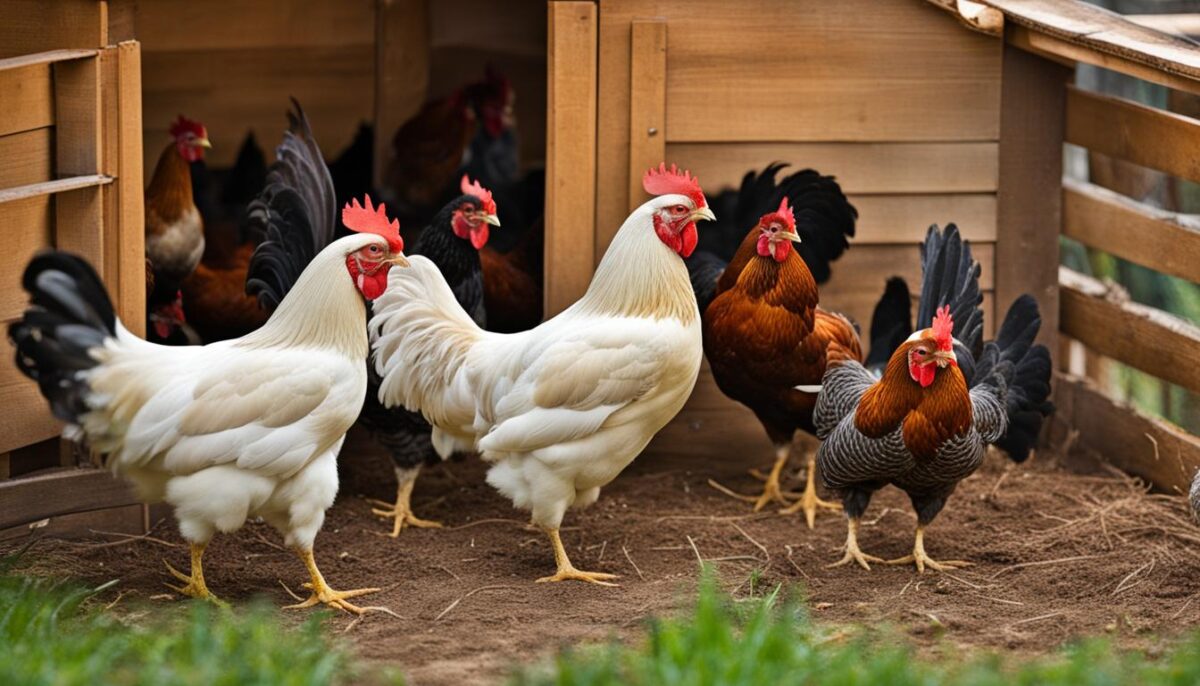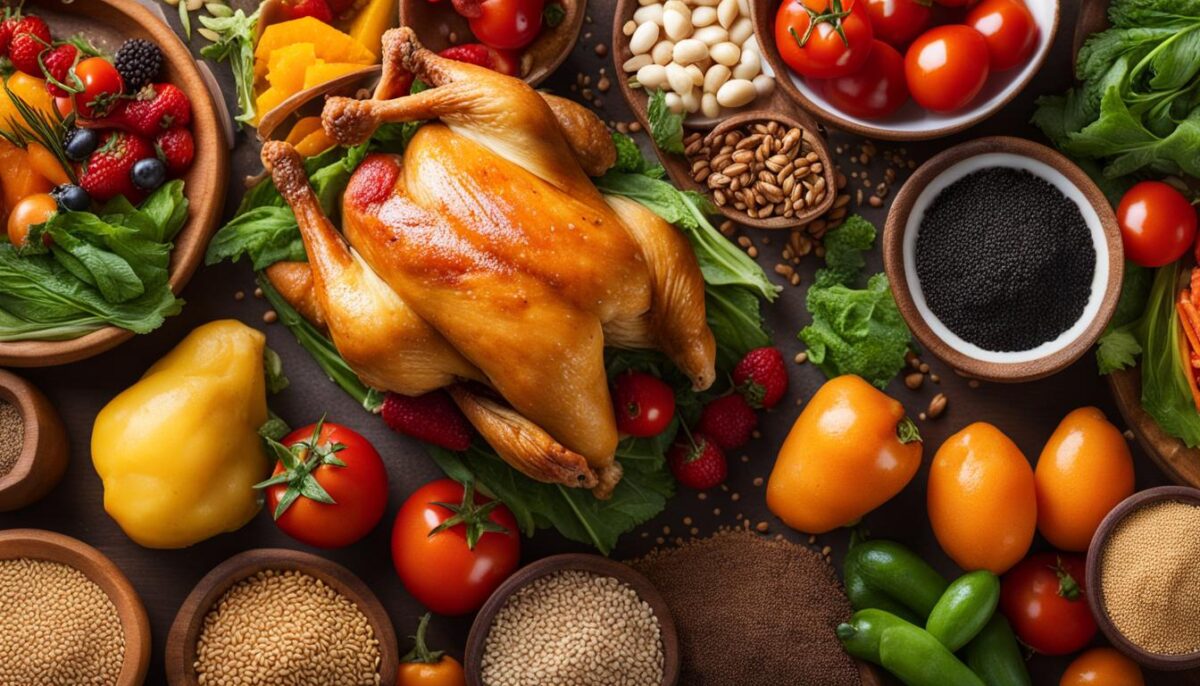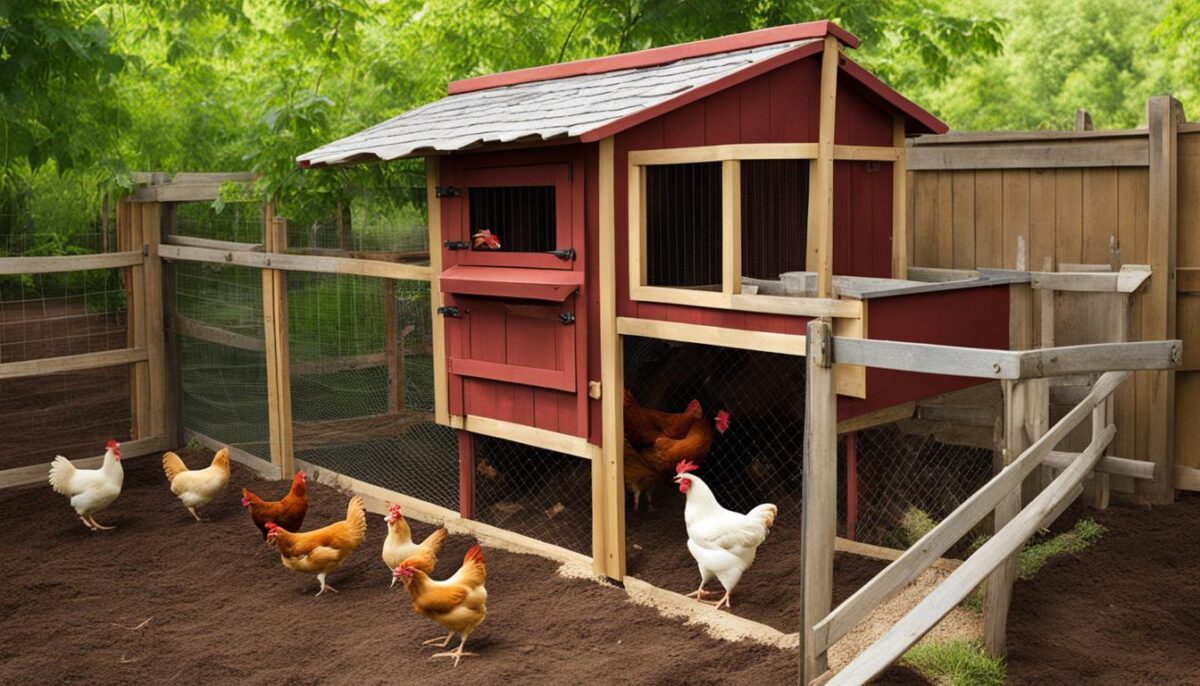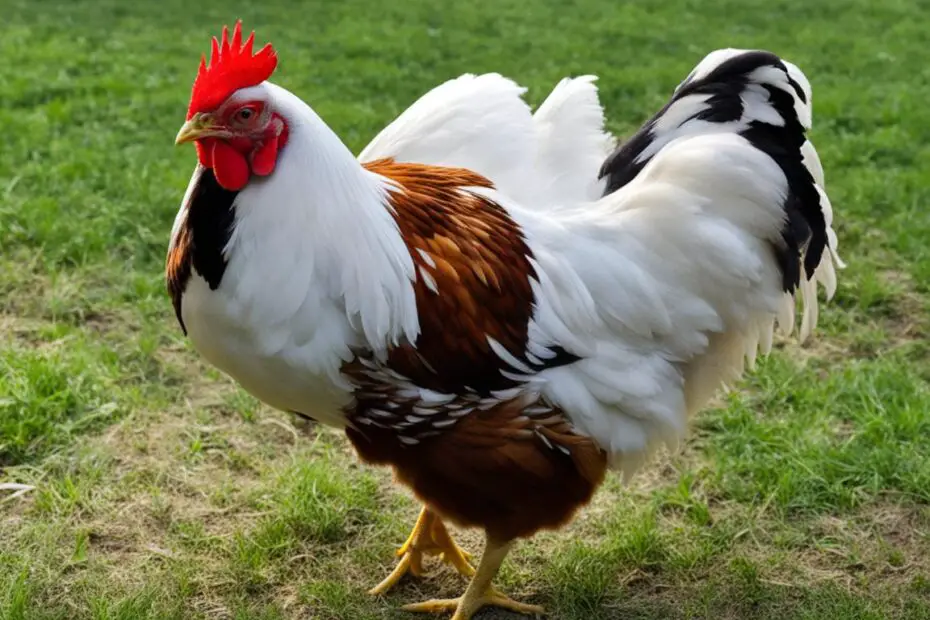Feather loss in chickens can be a cause for concern. Not only does it affect the appearance of your flock, but it may also indicate underlying health issues. Understanding the reasons behind feather loss is crucial for maintaining the well-being and productivity of your chickens.
There can be various causes for chicken feather loss. It could be a result of diseases, parasites, nutritional deficiencies, or even behavioral factors. By identifying the root cause, you can take appropriate measures to address the issue and support healthy feather growth in your chickens.
Key Takeaways:
- Feather loss in chickens can be caused by diseases, parasites, nutritional deficiencies, or behavioral factors.
- Understanding the specific cause of feather loss is important for implementing targeted solutions.
- Proper nutrition, biosecurity measures, vaccinations, and regular checks can help prevent and manage feather loss.
- Consulting with a veterinarian or poultry nutritionist can provide valuable guidance in maintaining feather health.
- Regular monitoring and prompt treatment of any signs of illness or feather damage are essential for the overall well-being of your flock.
Why Are My Chickens Losing Feathers
Ways to Make Money by Chicken Farming
Understanding Coccidiosis and its Impact on Feather Loss
Coccidiosis is an intestinal disease that can have a significant impact on feather loss in chickens. This disease is caused by a parasitic organism that damages the intestinal lining, leading to the inability to absorb vital nutrients. It primarily spreads through contaminated droppings and is more prevalent in young chickens.
The symptoms of coccidiosis include the presence of blood or mucus in droppings, weakness, weight loss, and a decrease in food and water consumption. Prompt treatment is essential, and medication such as Amprolium can be administered to combat the disease. However, prevention is equally important. why are my chickens losing feathers
Practicing good biosecurity measures, such as maintaining clean feeding and drinking areas, can help minimize the risk of coccidiosis. Additionally, creating a stress-free environment for the chickens can reduce the chances of them contracting the disease. Regular monitoring for any signs of coccidiosis and taking appropriate action is crucial for the overall health and well-being of the flock.
| Symptoms of Coccidiosis | Description |
|---|---|
| Bloody/mucus-filled droppings | Presence of blood or mucus in the chicken’s droppings. |
| Weakness | Reduced strength or energy in the chicken. |
| Weight loss | Unintended loss of body weight in the chicken. |
| Decreased food and water consumption | Reduced intake of food and water by the chicken. |
Preventing Coccidiosis
To prevent coccidiosis, it is crucial to maintain a clean and hygienic environment for the chickens. Here are some preventive measures you can take:
- Regularly clean and disinfect feeding and drinking areas to minimize the risk of contamination.
- Provide separate areas for eating, drinking, and resting to reduce crowding and stress.
- Practice good biosecurity by limiting exposure to other chickens and wild birds.
- Consult with a veterinarian to develop a suitable vaccination schedule for your flock.
- Monitor your chickens’ health regularly and seek veterinary assistance at the first sign of any illness.
By understanding the causes and symptoms of coccidiosis and implementing appropriate prevention and treatment measures, you can help protect your flock from this intestinal disease and minimize the risk of feather loss.
Behavioral Factors and Feather Pecking
Behavioral factors can have a significant impact on feather loss in chickens. Stress, overcrowding, and nutritional deficiencies are common causes of behavioral issues such as feather pecking and cannibalism. It is important to understand these factors and take preventive measures to ensure the health and well-being of your flock. chicken feather loss causes
Chickens are social animals, and stress can result from various factors such as inadequate space, predator attacks, or changes in their environment. When chickens experience stress, they may exhibit abnormal behaviors like feather pecking, where one chicken pecks at the feathers of another. Feather pecking can quickly escalate and lead to cannibalism, causing severe feather loss and potential harm to the injured bird. chicken feather problems
To prevent feather pecking and cannibalism, provide your chickens with a stress-free environment and meet their behavioral needs. Ensure they have enough space in their coop and run, allowing them to move and interact comfortably. Adequate feeding and watering stations can also reduce competition and minimize stress. Adding enrichment items like perches, dust baths, and vegetation can provide mental stimulation and divert their attention from feather pecking.
Additionally, providing a nutritionally balanced diet is crucial for preventing behavioral issues in chickens. A deficiency in certain nutrients, such as protein or certain vitamins, can lead to feather pecking. Consult with a poultry nutritionist or veterinarian to ensure that your chickens are receiving the right balance of nutrients to support their overall health and feather condition.

Understanding Stress in Chickens
Chickens, like any living beings, can experience stress. Recognizing and addressing stressors can help reduce the incidence of feather pecking and other behavioral issues. Some common sources of stress in chickens include:
- Lack of space or overcrowding
- Inadequate ventilation or poor air quality in the coop
- Predator threats or frequent disturbances
- Changes in flock dynamics or introduction of new birds
- Inadequate nutrition or imbalanced diet
By identifying and addressing these stressors, you can create a more positive environment for your chickens, promoting their overall well-being and reducing the risk of feather pecking behaviors. molting in chickens
Infectious Diseases and their Impact on Feather Health
Infectious diseases pose a significant threat to the health and feather condition of chickens. Viral, bacterial, and fungal infections can all contribute to feather loss and other symptoms that can impact the overall well-being of your flock. Understanding these diseases and their effects is essential for implementing effective prevention and treatment measures.
Viral Diseases in Chickens
Chickens are susceptible to various viral infections that can affect their feathers. One common viral disease is Newcastle disease, which can cause feather abnormalities and loss. Marek’s disease is another viral infection that can lead to feather follicle tumors, resulting in feather loss and a weakened immune system. Avian influenza is yet another viral disease that can cause respiratory issues in chickens, along with feather damage. stress and chicken feather loss
Bacterial Diseases in Chickens
Bacterial infections can also contribute to feather loss in chickens. One example is fowl cholera, a highly contagious bacterial disease that can lead to feather discoloration and loss. Infectious coryza is another bacterial infection that can cause respiratory symptoms, including nasal discharge and swollen sinuses, along with feather damage.
Fungal Diseases in Chickens
Fungal infections, such as aspergillosis, can also affect the feathers of chickens. Aspergillosis is caused by the Aspergillus fungus and can lead to respiratory issues, including difficulty breathing and coughing, as well as feather abnormalities. parasites and feather loss in chickens
Preventing and managing infectious diseases in chickens is crucial. Implementing biosecurity measures, such as proper quarantine protocols for new birds, regular cleaning and disinfection of coops, and limiting exposure to wild birds, can help reduce the risk of disease transmission. Vaccinations and prompt treatment of infected birds are also important for controlling infectious diseases and preserving feather health in your flock.
| Disease | Symptoms | Prevention | Treatment |
|---|---|---|---|
| Newcastle disease | Respiratory issues, feather abnormalities | Vaccination, biosecurity | No specific treatment |
| Marek’s disease | Feather follicle tumors, weakened immune system | Vaccination, biosecurity | No specific treatment |
| Avian influenza | Respiratory issues, feather damage | Vaccination, biosecurity | Supportive care |
| Fowl cholera | Feather discoloration, loss | Vaccination, biosecurity | Antibiotics |
| Infectious coryza | Respiratory symptoms, feather damage | Vaccination, biosecurity | Antibiotics |
| Aspergillosis | Respiratory issues, feather abnormalities | Biosecurity, proper ventilation | Antifungal medication |
Parasites and Feather Damage
Parasites can wreak havoc on the feather health of your chickens. Common poultry parasites include feather mites, chicken lice, ticks, and roundworms. These pesky creatures can cause irritation, feather damage, and even transmit diseases, compromising the overall well-being of your flock. nutritional deficiencies in chickens
Regular checks for parasites are essential to prevent infestations and ensure the health of your chickens. Inspect your birds regularly for signs of infestation, such as excessive scratching, feather loss, or visible parasites. If you notice any signs, it is important to take prompt action to avoid further damage. chicken feather regrowth
Proper hygiene practices are key to minimizing the risk of parasitic infections in your flock. Keep coops and nesting areas clean and dry, and regularly remove any droppings or debris. Provide dust baths for your chickens, as this helps to naturally control parasites.
Table: Common Poultry Parasites
| Parasite | Description | Prevention |
|---|---|---|
| Feather Mites | Microscopic mites that infest feathers and cause feather damage and irritation. | – Regularly inspect and treat affected birds – Maintain clean and hygienic living conditions |
| Chicken Lice | External parasites that live on the skin and feathers of chickens, causing feather loss, itching, and irritation. | – Regularly inspect and treat affected birds – Dust baths and providing clean bedding – Quarantine new birds before introducing them to the flock |
| Ticks | External parasites that feed on the blood of birds, causing irritation, disease transmission, and feather loss. | – Regularly inspect and treat affected birds – Remove tick-infested debris from the coop and surrounding areas |
| Roundworms | Internal parasites that live in the digestive system, causing poor growth, weight loss, and feather damage. | – Regular deworming of chickens – Proper sanitation practices |
By implementing regular checks, practicing good hygiene, and taking appropriate preventative measures, you can help protect your chickens from parasitic infestations and maintain their feather health.
Using Bitter Substances to Reduce Feather Pecking
Feather pecking is a common behavioral issue that can lead to feather loss in chickens. Fortunately, there are methods available to help prevent this behavior and maintain the health of your flock. One such method is the use of bitter substances, like quinine, to deter chickens from pecking at each other’s feathers.
Research has shown that spraying chicken feathers with a bitter substance can reduce feather pecking by half. While the effect is temporary and the spraying needs to be continuous, it can be an effective way to prevent feather damage caused by pecking. The bitter taste discourages chickens from pecking at each other’s feathers, ultimately reducing the occurrence of feather loss.
Implementing biosecurity measures and providing proper care for your chickens can also aid in minimizing feather pecking behaviors. By ensuring that your chickens have enough space, a balanced diet, and a stress-free environment, you can help alleviate any potential triggers for feather pecking.
Overall, using bitter substances like quinine, along with proper biosecurity measures and care, can significantly reduce feather pecking in your flock and maintain the health and feather condition of your chickens.

Table: Essential Nutrients for Feather Health
| Nutrient | Benefits | Sources |
|---|---|---|
| Protein | Builds strong, resilient feathers | Insects, legumes, soybean meal |
| Vitamin A | Supports feather growth and health | Dark leafy greens, carrots, sweet potatoes |
| Vitamin E | Protects feathers from oxidative damage | Wheat germ, nuts, seeds |
| Omega-3 Fatty Acids | Improves feather quality | Flaxseed, fish meal |
In addition to providing the right nutrients, it’s essential to ensure that chickens have access to clean, fresh water at all times. Dehydration can negatively impact feather health and overall well-being. Feeding a complete and balanced commercial poultry feed can help ensure that chickens receive the necessary nutrients for healthy feather growth.
Consulting with a veterinarian or poultry nutritionist can provide valuable guidance on formulating a diet that meets the specific nutritional needs of your flock. Regularly monitoring your chickens’ feather condition and making adjustments to their diet as needed will help maintain their feather health and overall vitality.
Understanding Molting and Feather Regrowth
During the molting process, chickens naturally shed their old feathers and grow new ones. This cycle typically occurs once a year and can last for several weeks. It is important for chicken keepers to understand this process to properly care for their flock and support healthy feather regrowth.

“Maintaining a clean and healthy environment is crucial for preventing feather loss in chickens and ensuring the overall wellbeing of your flock.”
| Biosecurity Measures | Importance |
|---|---|
| Regular cleaning and disinfection of coop, nesting boxes, and perches | Minimizes the risk of disease transmission |
| Isolating new flock members for quarantine period | Prevents the spread of potential infections |
| Regular monitoring of feathers, skin, and droppings | Early detection of diseases or parasites |
| Implementing strict hygiene practices | Reduces the risk of cross-contamination |
By implementing these biosecurity measures and practicing preventative care, you can significantly reduce the risk of feather loss in your chickens. Regular monitoring, proper hygiene, and prompt treatment of any signs of disease or feather damage are essential for maintaining the health and wellbeing of your flock.
Importance of Vaccinations and Medications
Proper vaccination and medication protocols are essential for preventing and treating diseases that can lead to feather loss in chickens. By consulting with a veterinarian, you can develop a vaccination schedule tailored to the specific needs of your flock, ensuring that they receive the necessary protection against common poultry diseases.
Vaccinations are a proactive measure that can significantly reduce the risk of infections that can impact feather health. They work by stimulating the chicken’s immune system to produce antibodies that provide immunity against specific diseases. Common vaccines include those for Marek’s disease, Newcastle disease, and infectious bronchitis. Following recommended vaccination protocols and administering vaccines correctly is crucial for their effectiveness.
In addition to vaccinations, medicated feed or supplements may be recommended as preventive measures to support overall chicken health. These products often contain medications such as coccidiostats that help control the spread and impact of diseases like coccidiosis. Proper administration and adherence to recommended dosage instructions are essential for maximizing the effectiveness of these medications.
By prioritizing vaccinations and medication protocols, you can proactively protect your chickens from diseases, minimize feather loss, and maintain the overall health and productivity of your flock.
| Vaccinations | Benefits |
|---|---|
| Marek’s disease vaccine | Provides protection against a highly contagious viral disease that affects the nervous system. |
| Newcastle disease vaccine | Prevents a highly contagious respiratory disease that can lead to feather loss and other health complications. |
| Infectious bronchitis | Helps protect against a viral respiratory disease that can affect the respiratory system and feather quality. |
Disease Prevention Tips
- Consult with a veterinarian to develop a vaccination schedule suitable for your flock.
- Ensure proper storage and handling of vaccines to maintain their efficacy.
- Follow recommended dosage instructions when administering medicated feeds or supplements.
- Practice good biosecurity measures, such as limiting flock exposure to potential sources of infection.
- Regularly monitor your chickens for any signs of illness or feather damage.
- Promptly treat any disease outbreaks or feather loss issues to prevent further spread and complications.
Proper vaccination and medication protocols are essential for preventing and treating diseases that can lead to feather loss in chickens.
Conclusion
In conclusion, maintaining healthy chicken feather health is crucial for the overall well-being and productivity of your flock. By understanding the various factors that can contribute to feather loss, such as diseases, parasites, nutritional deficiencies, and behavioral issues, you can take proactive steps to prevent and address these issues.
Implementing good biosecurity measures, such as regular monitoring, vaccinations, and proper hygiene practices, can help prevent the spread of diseases and parasites that can lead to feather damage. Providing a balanced diet with essential nutrients is vital for promoting healthy feather growth and preventing nutritional deficiencies.
Additionally, addressing behavioral issues, such as stress and overcrowding, is essential to minimize feather pecking and cannibalism. Regular checks for parasites and prompt treatment are necessary to prevent infestations that can cause feather damage.
By taking these preventative measures and providing your chickens with a stress-free environment, proper nutrition, and necessary treatments, you can maintain healthy feathers in your flock and ensure the overall well-being of your chickens.
FAQ
What are the common causes of feather loss in chickens?
Feather loss in chickens can be attributed to various factors, including diseases, parasites, nutritional deficiencies, and behavioral issues.
What is coccidiosis and how does it contribute to feather loss in chickens?
Coccidiosis is a common intestinal disease caused by a parasitic organism that damages the intestinal lining, leading to feather loss. It spreads through contaminated droppings and is more common in young chickens.
What are the symptoms of coccidiosis in chickens?
Symptoms of coccidiosis in chickens include blood or mucus in droppings, weakness, weight loss, and decreased food or water consumption.
How can I treat coccidiosis in chickens?
Treatment for coccidiosis involves administering medication such as Amprolium. It is important to maintain clean feeding and drinking areas and practice good biosecurity to prevent the disease.
What behavioral factors can contribute to feather loss in chickens?
Stress, overcrowding, and nutritional deficiencies can lead to behavioral issues such as feather pecking and cannibalism, which can cause feather loss.
How can I minimize behavioral issues that contribute to feather loss?
Providing adequate nutrition, proper housing conditions, and a stress-free environment can help minimize behavioral issues and reduce feather loss in chickens.
What are common infectious diseases that can cause feather loss in chickens?
Viral, bacterial, and fungal infections are common causes of feather loss in chickens. These diseases can affect various systems in the chicken’s body and can be easily transmitted between birds.
What are the symptoms of infectious diseases in chickens?
Symptoms of infectious diseases in chickens may include respiratory issues, reduced egg production, and skin abnormalities.
How can I manage infectious diseases to prevent feather loss?
Effective biosecurity measures and prompt treatment are essential for managing infectious diseases and preventing feather loss in chickens.
What parasites can cause feather damage in chickens?
Feather mites, chicken lice, ticks, and roundworms are common parasites that can cause feather damage in chickens.
How can I prevent parasitic infections that cause feather damage in chickens?
Regular checks for parasites and proper hygiene practices, such as maintaining clean living conditions, can help prevent parasitic infections and maintain feather health in chickens.
Can spraying chicken feathers with a bitter substance help prevent feather pecking?
Yes, spraying chicken feathers with a bitter substance, such as quinine, has been found to reduce feather pecking by half. Continuous spraying is necessary for effectiveness.
How can I prevent feather pecking in chickens?
Implementing biosecurity measures, providing proper care, and maintaining a stress-free environment can help minimize feather pecking behaviors in chickens.
How does nutrition impact feather health in chickens?
Proper nutrition, including essential vitamins, minerals, and proteins, is crucial for maintaining healthy feathers in chickens. Nutritional deficiencies can lead to feather loss and other health issues.
What is molting and how does it affect feather health?
Molting is a natural process in which chickens shed old feathers and grow new ones. Feather loss is common during molting, but feathers will gradually regrow as the process comes to an end.
How can I support healthy feather regrowth during molting?
Providing proper nutrition and a stress-free environment during molting is crucial for supporting healthy feather regrowth in chickens.
What preventative measures can I take to maintain feather health in my flock?
Practicing good biosecurity, maintaining clean feeding and drinking areas, monitoring for signs of disease, and regularly checking for parasites are crucial preventative measures for maintaining feather health in chickens.
How important are vaccinations and medications in preventing feather loss in chickens?
Vaccinations and medications play a crucial role in preventing and treating diseases that can lead to feather loss. Consult with a veterinarian to develop a suitable vaccination schedule and consider medicated feed or supplements for disease prevention.


